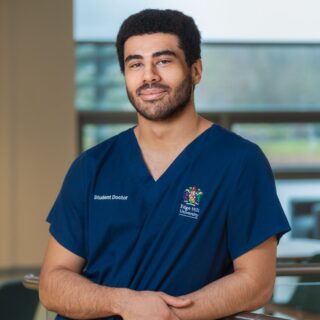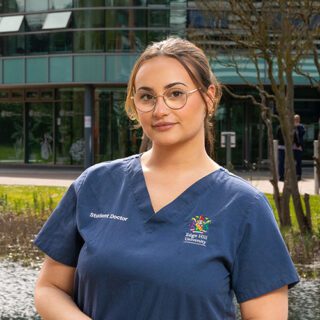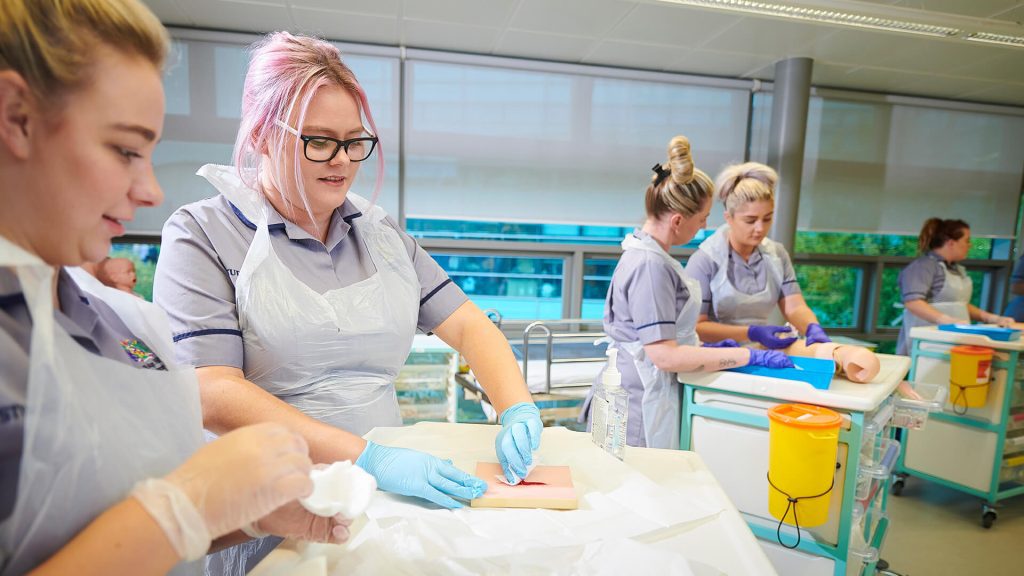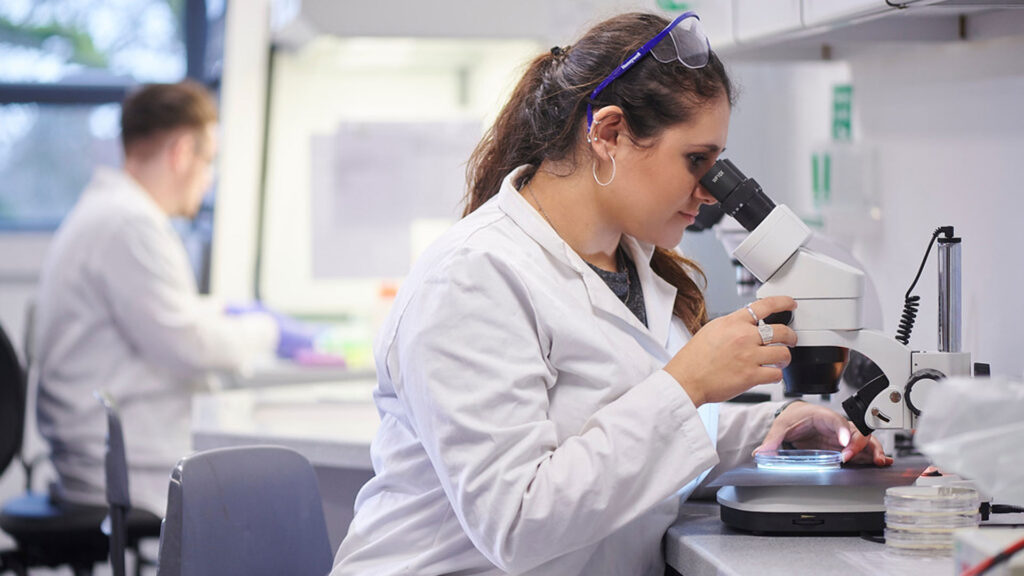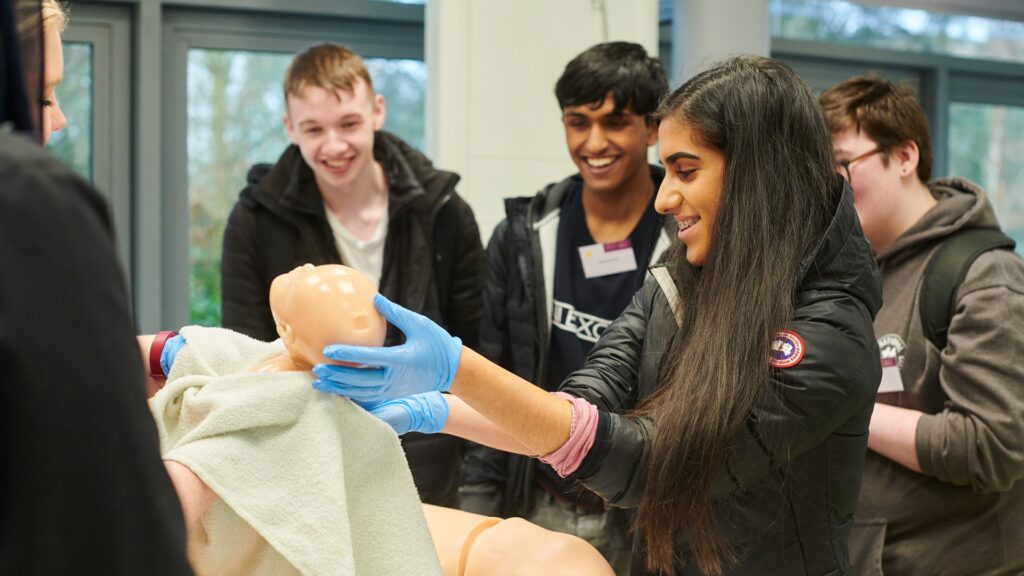Medicine MBChB
UCAS code: A100
Gain eligibility to apply for provisional registration as a doctor with the General Medical Council, with the skills, knowledge and clinical practice experience needed to diagnose and manage patients effectively.
Overview
| Course length: | 5 years full-time |
|---|---|
| Start dates: | September 2025 September 2026 |
| Location: | Edge Hill University (full-time) |
| Example offers: | AAA (A Level) View full entry criteria |
| Subject(s): | Medicine |
| Faculty: | Health, Social Care and Medicine |
| Department: | Medical School |

The MBChB Medicine is also available as an integrated 6-year programme, MBChB Medicine with Foundation Year, where you will complete a Foundation Year before progressing onto the MBChB Medicine degree.
This five-year programme enables you to gain a Primary Medical Qualification and to apply for provisional registration with the General Medical Council. With a focus on developing future doctors who have patient safety, reflection and professionalism at the core of their practice, the MBChB involves early and extensive clinical placements with a focus on community and mental healthcare settings, as well as exposure to medicine, surgery and a range of hospital specialities. Theory and practice are integrated through a hybrid of case-based and team-based learning alongside extensive clinical skills and simulation training. Equipped with medical leadership skills, resilience and an understanding of public health, you will graduate fully prepared for practice as a doctor and ready to make a major contribution to the healthcare services of today and tomorrow.
In common with all new UK medical schools, Edge Hill University Medical School is subject to successful progress through the GMC’s rigorous quality assurance processes. We have successfully completed several stages of this process and will now be subject to ongoing review. The final-stage assessment and approval for the award of a UK medical degree is at the end of the first complete delivery of the course. The University of Liverpool will act as our contingency school during this time.
Course features
-
Professional accreditation
-
Professional practice placements
What you'll study
Each year of the course carries a distinct overarching theme, with patient safety and professionalism key priorities across the whole course.
You will gain an understanding of key concepts within the science of medicine; explore the structure and function of the human body, examine the social and psychological context of health and illness, and discover how health care is delivered as part of a multi-disciplinary team.
This knowledge will be aligned with key legal and ethical principles, the development of diagnostic, decision-making, communication and reflection skills, as well as personal and professional attitudes that align to the profession. When you qualify with an MBChB Medicine with us, you will have been prepared for practice as a foundation year doctor.
The Person and the Community
The focus in Year 1 of the Medicine (MBChB) degree is on the life sciences, with an emphasis on the normal structure and function of the whole human body. You will explore the seven core systems (endocrine, musculoskeletal, cardiovascular, respiratory, gastrointestinal, urogenital and neuroscience) and receive a grounding in public health and social science. The aim is to build your understanding of health, normal variation, diversity and the contexts in which people live.
Understanding Where and How People Receive Health Care
There will be a greater focus on the patient in Year 2. You will gain an increased understanding of illness and wellbeing and more clinical exposure (including general practices and hospitals) with an emphasis on the different settings in which patients receive their care. You will also undertake a community-related project.
Integrative Care Within Multi Disciplinary Teams
Year 3 of the Medicine (MBChB) degree provides an insight into care for specific patient groups in hospital and community settings. As you increase your clinical exposure, your learning will be supported through consolidation weeks at university. As well as enhancing your clinical and professional skills, there will be a focus on how doctors work with other disciplines in health and social care to deliver high quality, person-centred care.
The Patient Journey – The Interface Between Primary and Secondary Care.
There will be a greater clinical emphasis in Year 4 within a range of specialities. You will also reflect on the relationship between primary and secondary care and consider where it is most appropriate to treat patients in a range of different circumstances;
Preparedness for Practice.
Year 5 of the MBChB is an apprentice year which will fully prepare you for practice. It will include student assistantships, a specialist placement and a focus on acute medicine. You will be given increasing clinical responsibility for patient care and support as you progress towards the end of the programme and your intended future career path.
How you'll study
The MBChB Medicine degree programme utilises a wide variety of different teaching and learning opportunities. It will be delivered through a combination of lectures, seminars, science-based practical sessions, clinical skills and simulation sessions, tutorials and clinical placements in local healthcare settings.
The main educational approach across the first two years will be a hybrid model of case-based learning and team-based learning to equip you with essential inquiry, critical thinking and problem-solving skills. A spiral curriculum will be adopted, enabling you to revisit topics, build on previous knowledge, link theory to practice, and gain increasing confidence.
Although the weekly direct contact hours will vary, attendance will typically be required for four to five days a week. Your placements will be in the North West of England and you will be responsible for travel and parking costs while on placement.
You will be provided with scrubs to wear on placement, when appropriate. At other times, you will be responsible for providing your own professional attire, depending on placement requirements.
As your clinical exposure increases, you will return to the University at regular intervals between placements for consolidation weeks. This will enable further teaching around public health, research methods or professionalism, additional clinical skills training and simulation relevant to a forthcoming placement, inter-professional education, reflection, careers support and contact with your Personal Tutor.
How you'll be assessed
The assessment methods on the MBChB Medicine degree programme include research projects and written assignments, objective structured clinical examinations (OSCEs), and written examinations. Your skills and professionalism will also be assessed on clinical placements and via a portfolio.
The General Medical Council are introducing a national Medical Licensing Assessment in 2024. This will include a written test and a clinical and professional skills assessment. Medicine students graduating from academic year 2024/25 onwards will need to pass the Medical Licensing Assessment to gain the MBChB award and secure eligibility to apply to the General Medical Council for provisional registration.
Who will be teaching you
You will be taught by a team of medical practitioners, other health professionals and academics who have a comprehensive range of medical and surgical specialities. These include mental health and primary care professionals, biomedical scientists, public health specialists, psychologists, medical education and clinical researchers, legal experts, sociologists and nurses.
Complementing the programme team from Edge Hill University and local health care settings will be a variety of service users and carers, as well as expert guest lecturers, including senior clinicians, who will cover specialist themes.
Themes
Adopting a non-modular approach, the curriculum is aligned with sixteen themes which have been mapped against the requirements of the General Medical Council’s Outcomes for Graduates (2018).
- Professionalism and ethical responsibilities – newly qualified doctors must conduct themselves in line with professional and ethical principles. You will learn these responsibilities throughout the course.
- Legal responsibilities – you will develop knowledge of the principles of the legal framework and jurisdiction in which medicine is practiced and gain awareness of where further information on relevant legislation can be found.
- Patient safety and quality improvement – newly qualified doctors must demonstrate they can practise safely. You will therefore learn how to take part in and promote activity designed to improve the quality and safety of patient care and clinical outcomes.
- Dealing with complexity and uncertainty – the nature of illness is complex, and the health and care of patients can frequently be complicated and uncertain. You will discover how to recognise complexity and uncertainty and develop confidence in managing these situations and responding to change.
- Safeguarding vulnerable patients – you will gain the skills and knowledge required to recognise and identify factors that suggest patient vulnerability and take appropriate responsive action.
- Leadership and team working – you will explore how doctors contribute to the management and leadership of the health service.
- Communication and interpersonal skills – you will discover how to communicate openly, honestly and effectively with patients and their relatives, carers and other advocates, as well as with colleagues. The importance of patient confidentiality will be a key focus of this strand of the course.
- Diagnosis and medical management – collaborative working with patients and colleagues is essential in the diagnosis and safe management of clinical presentations, whether they take place in patients’ homes or community, primary or secondary care settings. Newly qualified doctors must, wherever possible, support and facilitate patients to make decisions about their care and management. You will therefore learn, under supervision, how to perform a range of diagnostic, therapeutic and practical procedures both safely and effectively, as well as identifying, according to your level of skill and experience, the procedures for which supervision is required to ensure patient safety. You will discover how doctors work collaboratively with patients, their relatives, carers or other advocates to make clinical judgments and decisions based on a holistic assessment of patients and their needs, priorities and concerns. Pathophysiological, psychological, spiritual, religious, social and cultural factors will also be considered.
- Prescribing medications safely – you will learn how to prescribe medications safely, appropriately, effectively and economically and develop an understanding of the common causes and consequences of prescribing errors.
- Using information safely and effectively – discovering how to use information safely and effectively in a medical context, you will develop the skills and knowledge required to maintain accurate, legible, contemporaneous and comprehensive medical records.
- The health service and healthcare systems in the four countries – you will learn how patient care is delivered in the health service in England, Scotland, Wales and Northern Ireland.
- Applying biomedical scientific principles – newly qualified doctors must be able to apply biomedical scientific principles, methods and knowledge to medical practice and integrate these into patient care. You will study the principles and knowledge relating to anatomy, biochemistry, cell biology, genetics, genomics and personalised medicine, as well as immunology, microbiology, molecular biology, nutrition, pathology, pharmacology, clinical pharmacology and physiology.
- Applying psychological principles – you will explore the principles, underpinned by professional experience, for the identification, safe management and referral of patients with mental health conditions.
- Applying social science principles – you will be introduced to social science principles and methods and discover how to apply this knowledge to medical practice and integrate it into patient care.
- Health promotion and illness prevention – focusing on promoting health and preventing illness will enable you to apply the principles, methods and knowledge of population health, the improvement of health, and sustainable healthcare to medical practice.
- Clinical research and scholarship – you will learn, partly through practical experience, how to apply scientific methods and approaches to medical research.
Entry criteria
Grades AAA at A Level are required. These must include Biology and Chemistry and one other subject.
While Biology and Chemistry are both required at Grade A or above, where Grade A* is achieved in either Biology or Chemistry (or both Biology and Chemistry), the third A Level subject will be accepted at Grade B or above.
A Levels in General Studies, Critical Reasoning, Citizenship and Key Skills will not be accepted.
You will also need at least five GCSEs at Grade B or Grade 6 or above (or equivalent) at the time of application, including Biology, Chemistry, English Language and Mathematics. GCSE Double Science Awards, at Grades 6-6 or B-B or above, will also be accepted in lieu of separate GCSEs in Biology and Chemistry.
Acceptable equivalencies to A Levels are listed under Example Offers below.
You must be aged 18 or above on the first day of the course. The course will typically begin in mid-September although the exact date will vary for each academic year.
Applicants will be required to take the UCAT Medical Admissions Test prior to application. UCAT scores and Multiple Mini Interviews (MMIs) form part of the selection process. UCAT scores can only be used to support an application if they were achieved in the relevant admissions cycle prior to your intended year of entry.
Applicants are expected to meet the General Medical Council Outcomes for Graduates (2018). To achieve these, applicants must be of good character and must be open and honest about health conditions or disabilities to ensure and uphold public trust. It is essential that any issues which may prevent future registration or impact on a student’s practice are declared at the time of application. For example, this includes health, disability, criminal conduct or restrictions on practice imposed by a professional regulatory body. Whilst such declarations will not be taken into consideration in the initial stages of selection, any offers made will be subject to appropriate clearance as detailed below. Applications should be completed as honestly as possible and without omissions. The University reserves the right to withdraw any offer of interview or place on the MBChB Medicine course if it becomes aware of any dishonesty or failure to disclose information. Edge Hill University may verify an applicant’s health and character by sharing the applicant’s details with the Medical Schools Council for checking against the Medical Schools Council Excluded Students Database.
If you accept a formal offer from Edge Hill University you will need to submit a Declaration of Health in respect of physical and mental fitness. You may be contacted by the University’s nominated Occupational Health Service provider and/or be required to attend an appointment with them to confirm that you can meet the fitness to practise requirements to enter the course.
You will also be required to apply for a Disclosure and Barring Service (DBS) Enhanced Disclosure indicating that you meet the mandatory criteria of ‘Clearance to Work with Children and/or Vulnerable Adults’.
Further information about the Declaration of Health and DBS Enhanced Disclosure will be sent to you after you have firmly accepted an offer.
Are there any alternative ways to meet the entry requirements?
If you meet a specific set of widening participation criteria and grades, you may be able to join a six-year integrated version of this programme, MBChB Medicine with Foundation Year, where you will complete a Foundation Year before progressing onto the MBChB Medicine degree.
Alternatively, if you have already completed a degree, MBChB applications will be considered from graduates with a 2:1 or above who have studied a science related programme, including Psychology, which has been awarded in the two years prior to application. If you graduated prior to this but have undertaken postgraduate study in the past two years, you are also encouraged to apply.
Graduates must have grades ABB at A Level which must include Biology and Chemistry, at least one of which must be at Grade A or above with the other at minimum Grade B, as well as one other subject. A Levels in General Studies, Critical Reasoning, Citizenship and Key Skills will not be accepted. Graduate applicants must also meet the GCSE requirements outlined in the standard entry criteria above, submit a Declaration of Health in respect of physical and mental fitness and apply for a Disclosure and Barring Service (DBS) Enhanced Disclosure. There is no graduate entry point onto the MBChB. Graduates will therefore be required to undertake the full programme.
We will also consider applications from students who are in the early stages of another non-medical degree who wish to withdraw and/or have not completed a previous non-medical degree, as long as our standard MBChB entry criteria are met. No recognition of prior learning (RPL) will be considered on this basis.
We will not accept applications from students who wish to transfer from other medical programmes or who have previously started a medical degree but failed to progress on this.
Example offers
You can satisfy the A Level criteria by achieving one of the following combinations:
- Grades AAA including Biology and Chemistry and one other subject.
- Grades A*A*B or A*AB including Biology and Chemistry at Grade A or above and one other subject at Grade B or above.
The following are also accepted in lieu of A Levels:
- International Baccalaureate: Pass Diploma with 36 points or more to include three subjects at higher level, with at least 6 points in Biology, 6 points in Chemistry and one other subject, plus three further subjects at standard level with a minimum of 5 points each. If you are studying International Baccalaureate Biology and/or International Baccalaureate Chemistry in combination with other A Level subjects, this can be accepted as long as 6 points at higher level are achieved in these subjects.
- Irish Leaving Certificate: Three higher level subjects at Grade H1, including Biology, Chemistry and one other subject, and three at Grade H2, including English Language and Mathematics.
- Scottish Highers: AAAAB or above and including Biology, Chemistry and three other subjects.
- Advanced Highers: AAA in Biology, Chemistry and one other subject.
- Cambridge Pre-U: D3D3D3 in Biology, Chemistry and one other subject.
- Completion of a Quality Assurance Agency for Higher Education (QAA) approved Access to Higher Education Diploma (Medicine): 60 credits overall with distinction in 45 Level 3 credits, with at least 15 level 3 credits in Chemistry and at least 15 Level 3 credits in Biology, with the remainder in one other subject. The course must comply with the QAA’s subject descriptor for Medicine. You must not have commenced the Access course less than 3 years since completing A-level or degree study. Access courses taken in place of resitting A-levels are not recommended. The Access to Higher Education Diploma (Medicine) must have been obtained within the two years prior to application. You must meet the standard GCSE (or equivalent) requirement.
Please note, we are unable to accept BTEC Extended Diploma qualifications for this course. All A Level qualifications, or accepted equivalents, must have been obtained within the two years prior to application.
If you have any queries about whether your qualifications will satisfy the entry criteria for this course, please email [email protected] and we will be happy to advise you.
English language requirements
Applicants who have studied overseas and who do not have GCSE English (first) Language at B/6 or above or recognised equivalent, must gain IELTS at the required level.
These levels are currently IELTS of 7.5 overall (with no elements below 7.0) for entry onto the MBChB with FY and the MBChB Programmes. IELTS do not need to be gained prior to application but must be listed as pending on the application form and achieved prior to interview.
IELTS cannot replace GCSE English Language at Grade B or Grade 6 or above for applicants who have studied GCSEs.
For applicants who have already completed IELTS, these must be gained within two years of starting the course
Selection process
Stage 1: Application screening against the standard academic criteria
All applications will be screened to determine whether they meet the standard academic criteria. Applications which do not meet the minimum eligibility and academic criteria will not be progressed to the next stage.
Stage 2: UCAT ranking
Applicants who meet the minimum academic criteria will be ranked according to their UCAT scores. A UCAT threshold will be set depending on the number of interviews to be held.
Applicants who meet the UCAT threshold will be invited to interview. The UCAT threshold set by the University may differ from year to year as it is dependent on the scores achieved by those who apply to us in each admissions cycle. Any candidate scoring within band 4 in the Situational Judgement Test will be automatically rejected.
The UCAT threshold will be extended for candidates who meet specific widening participation criteria or have successfully completed the Widening Access to Medicine Programme at Edge Hill University.
Stage 3: Interview
All candidates who progress from stage 2 will be required to attend interview. Interviews for September 2023 entry will take place in January 2023.
The interview will take the form of Mini Multiple Interviews (MMI) which could assess the following (mapped onto good medical practice):
- Understanding and motivation for wanting to join the MBChB programme at Edge Hill University.
- Verbal communication skills.
- Integrity/probity.
- Teamwork/leadership.
- Empathy and compassion.
- Awareness of current health challenges.
- Ethical awareness.
- Awareness of self and others.
- Prioritisation/decision making.
- Interpretation of data.
Stage 4: Scoring
A score will be given for performance at each MMI station and individual scores combined. Applicants will be ranked according to their overall MMI score and offers made to the top students.
Offers will be made to candidates who have the highest combined scores subject to satisfactory references. The personal statement and reference will be used to allow us to distinguish between borderline applicants.
Additional requirements
As outlined in the entry criteria, if you accept an offer from Edge Hill you will be required to complete a Declaration of Health questionnaire and may be contacted by the University’s nominated Occupational Health Service provider and/or be required to attend an appointment with them.
You will also be required to apply for a Disclosure and Barring Service (DBS) Enhanced Disclosure indicating that you meet the mandatory criteria of ‘Clearance to Work with Children and/or Vulnerable Adults’.
Admissions policy
Our admissions policy for this course and Medical School admission appeals procedure for this course are available to download.
How to apply
Apply full-time
Read our guide to applying through UCAS to find out more about the application process.
International
EU/EEA and Swiss students who have settled or pre-settled status under the EU Settlement Scheme, as well as Irish nationals, are eligible to apply for this course.
Please note this course is not available to other international students. Please see our A-Z of courses for alternative options.
Should you accept an offer of a place to study with us and formally enrol as a student, you will be subject to the provisions of the regulations, rules, codes, conditions and policies which apply to our students. These are available at www.edgehill.ac.uk/studentterms.
If you join a full time undergraduate degree at Edge Hill University, we will guarantee you the offer of a room in our halls of residence for the first year of your course.
Discover our accommodation
Facilities

The Faculty of Health, Social Care and Medicine offers outstanding facilities for the education and training of health and social care professionals.
The contemporary teaching and learning resources include leading edge clinical skills facilities, an 860-seat lecture theatre, and a variety of teaching rooms and social learning spaces.
Where you'll study
Learning resources
The Clinical Skills and Simulation Centre offers a variety of simulated environments from home, through primary and emergency care, to secondary care and beyond. The flexible and adaptable facilities include a ward environment, operating theatre, an anatomy and ultrasound resource centre, a ‘Better at Home’ suite, clinical skills area and consultation rooms.
You will benefit from access to a wide variety of healthcare equipment, as well as a range of full-body patient simulators that can breathe, talk, have pulses and can simulate a wide range of symptoms and clinical conditions. This will enable you to undertake practical scenarios in realistic settings, providing ideal preparation for professional practice placements and future employment.
Finance
Tuition fees
UK Full-Time
£9,535
a year
EU/EEA and Swiss students who have settled or pre-settled status under the EU Settlement Scheme, as well as Irish nationals, may be eligible for the UK tuition fee rate.
Financial support
An NHS bursary is available subject to availability during the 5th and 6th year of study. Please visit the Gov.UK page containing information on NHS bursaries for further information.
Subject to eligibility, UK students joining this course can apply for a Tuition Fee Loan from the Government to cover the full cost of tuition fees. UK students enrolling on the course may also be eligible to apply for additional maintenance loan funding to help with living costs.
Scholarships
We offer a range of scholarships, which celebrate the determination, commitment and achievement of our students. Many of our scholarships are awarded automatically. There are some however, where you will need to be involved in an application or nomination process. To find out more about our scholarships and check your eligibility, please visit our dedicated scholarships pages.
Money Matters
Please view the relevant Money Matters guide for comprehensive information about the financial support available to eligible UK students, together with details of how to apply for potential funding.
EU/EEA and Swiss students who have settled or pre-settled status under the EU Settlement Scheme may be eligible to apply for financial support. Irish nationals can ordinarily apply to Student Universal Support Ireland (SUSI). Please see our EU student finance page for further details.
Your future career
Future career opportunities are excellent. Successful completion of this programme will lead to a Primary Medical Qualification which will enable you to apply to the General Medical Council (GMC) for provisional registration and licence to practise, subject to meeting any additional GMC criteria such as fitness to practise.
Provisional GMC registration with a licence to practise enables doctors to work in approved UK Foundation Year 1 (F1) posts, subject to any additional requirements like passing a Situational Judgement Test. You are not allowed to undertake any other service post. After successful completion of the GMC Foundation Programme you can apply for full GMC registration. Candidates should be aware that regulations may change and they should consult the GMC website at www.gmc-uk.org for further details and the latest information.
Course changes
Every effort has been made to ensure the accuracy of this information, however our courses are subject to ongoing review and development. Changing circumstances may necessitate alteration to, or the cancellation of, courses.
Changes may be necessary to comply with the requirements of professional bodies, revisions to subject benchmarks statements, to keep courses updated and contemporary, or as a result of student feedback. We reserve the right to make variations if we consider such action to be necessary or in the best interests of students.
